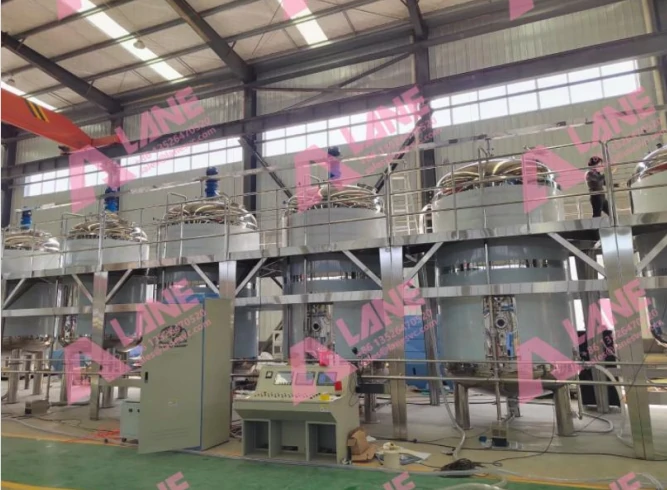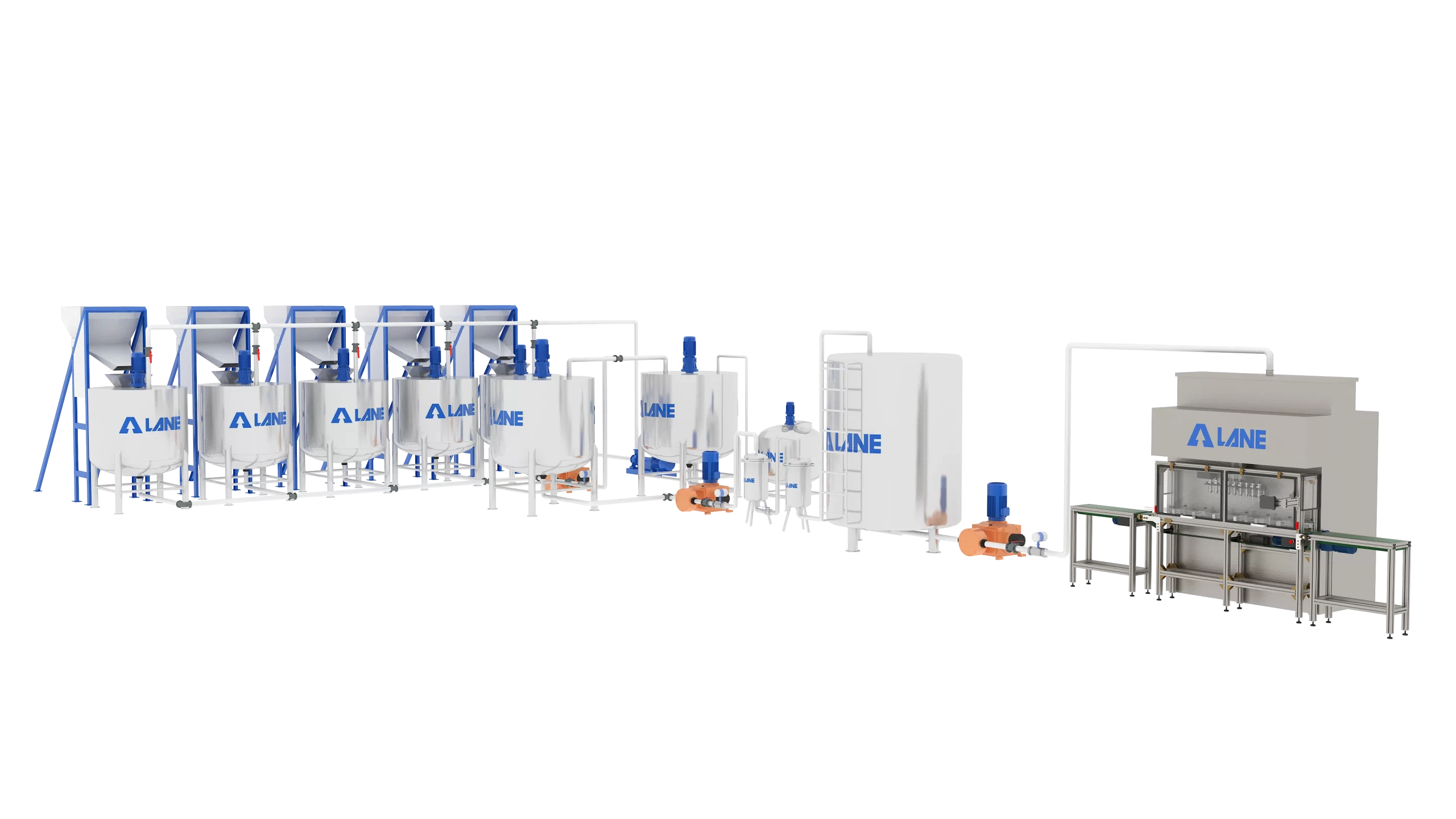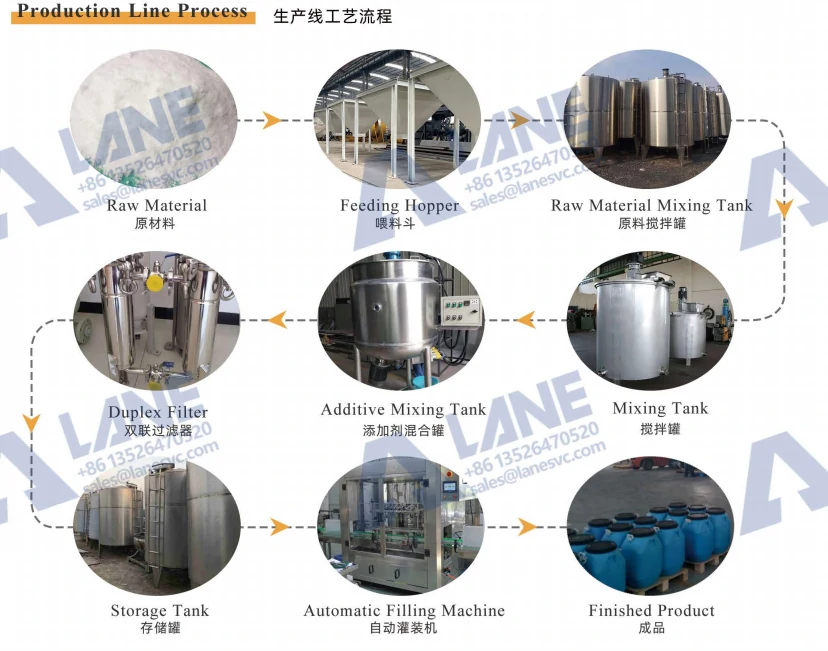
Complete Liquid Fertilizer Plant Solution: Engineering Efficiency for Modern Agriculture
Complete liquid fertilizer plant solution is more than a technical system—it represents the future of scalable, sustainable crop nutrition. Farmers and agricultural enterprises around the world are turning to liquid fertilizers because they can absorb nutrients more quickly, offer flexible application methods, and be compatible with precision agriculture technologies. However, to achieve large-scale production efficiency, an integrated and meticulously designed plant is needed, capable of handling raw materials, precise formulations, and achieving large-scale output while minimizing waste to the greatest extent.
This is precisely where the demand for a complete liquid fertilizer plant solution lies: from raw material processing to automated mixing, storage, quality assurance and packaging, each stage must be seamlessly connected. At LANE, we not only provide equipment, but also offer confidence, combining engineering expertise with decades of fertilizer plant design and implementation experience.

Liquid fertilizers are no longer a niche product; they are rapidly expanding into mainstream markets. Farmers are drawn to the efficiency of foliar sprays, fertigation, and drip-irrigation-compatible formulations. For manufacturers, however, the challenge is consistency, scalability, and compliance with regulatory standards.
A complete liquid fertilizer plant solution ensures:
End-to-End Integration – No gaps between raw material handling, formulation, and distribution.
Customization – Ability to produce NPK liquids, micronutrient blends, humic acid fertilizers, or specialized foliar applications.
Sustainability – Reduced energy use and minimized environmental impact through efficient design.
Profitability – Increased production throughput while maintaining high product quality.
LANE specializes in tailoring these systems for agribusiness clients across Asia, Africa, the Middle East, and Latin America, ensuring not just installation but long-term performance.
To build a high-performing facility, each piece of equipment in a complete liquid fertilizer plant solution must be carefully selected and integrated. Below is an overview of the essential components:
| Stage | Equipment | Function |
| Raw Material Feeding | Stainless Steel Storage Tank, Screw Conveyor | Safely stores and transfers urea, phosphates, potash, or organic extracts without contamination. |
| Dissolution & Mixing | Stainless Steel Mixing Tank | Ensures complete dissolution of solid fertilizers and homogeneous blending of liquids. |
| Precision Dosing | Precision Metering Pump, Flow Meter | Provides accurate control of nutrient ratios for consistent formulations. |
| Reaction & Stabilization | Chemical Reactor with pH Controller | Maintains nutrient solubility, stability, and correct pH balance. |
| Filtration & Quality Control | Dual Filter System, Inline Quality Sensors | Removes impurities and guarantees clarity, viscosity, and nutrient concentration. |
| Storage | Stainless Steel Storage Tank | Keeps liquid fertilizers stable with temperature and pH monitoring. |
| Packaging | Automated Liquid Filling Machine, Sealing System | Packages final product into bottles, drums, or bulk containers efficiently. |
Building a complete liquid fertilizer plant solution requires more than just raw materials; it depends on an organized, equipment-driven workflow. Below is an operator-friendly step-by-step breakdown:
Step 1 – Raw Material Storage and Feeding
Solid and liquid raw materials such as urea, MAP/DAP, potassium nitrate, and trace minerals are safely stored in stainless steel storage tanks. A screw conveyor or pumping system transfers them into the processing line without contamination.
Step 2 – Dissolution in Stainless Steel Mixing Tank
Raw materials are transferred to a stainless steel mixing tank equipped with a high-efficiency agitator. Here, solid fertilizers dissolve completely, and liquid inputs blend uniformly, ensuring no sedimentation or nutrient stratification.
Step 3 – Precision Dosing and Ratio Adjustment
A precision metering pump and flow meter regulate the nutrient ratios according to the desired fertilizer formulation. This guarantees accuracy and consistency, vital for commercial-scale production.
Step 4 – Reaction and Stabilization
The mixed solution flows into a chemical reactor with pH control system. At this stage, nutrients stabilize, solubility is optimized, and the correct chemical balance is maintained to prevent precipitation.
Step 5 – Filtration for Purity
Before storage, the liquid passes through a dual filter system and inline quality sensors. These remove impurities and ensure the fertilizer has the correct clarity, viscosity, and nutrient concentration.
Step 6 – Secure Storage
The filtered solution is stored in jacketed stainless steel storage tanks that maintain controlled temperature and pH stability. This prevents nutrient degradation during holding time.
Step 7 – Automated Packaging
Finally, the finished product enters an automated liquid filling machine with sealing system, packaging it into bottles, drums, or bulk containers ready for distribution. Automation ensures speed, precision, and minimized labor costs.

The strength of a complete liquid fertilizer plant solution lies not only in reliable equipment but also in the smart technologies that drive efficiency, consistency, and sustainability. Modern plants rely on PLC control systems, automatic dosing devices, and sensors supporting the Internet of Things to monitor parameters such as pH value, nutrient concentration, and temperature. This integration ensures that every liter of fertilizer maintains the highest quality standards while minimizing resource consumption.
LANE has long recognized that technology is the backbone of modern production. By equipping the facilities with stainless steel mixing tanks, dual filtration systems and precision metering pumps, our factory is able to maintain operational stability and quickly adapt to different production demands.
However, the real transformation is taking place in innovation. Besides process automation, new perspectives are shaping the operation methods of fertilizer factories and the interaction patterns with the entire agriculture:
Intelligent Automation and Monitoring: By leveraging IoT sensors and cloud-based dashboards, operators can gain real-time visibility, enabling predictive maintenance and reducing downtime.
Artificial intelligence-driven nutrition formulas: Nowadays, artificial intelligence can analyze soil data and crop requirements, enabling fertilizer factories to produce customized nutrient mixtures, thereby enhancing agricultural productivity.
Design centered on sustainability: From energy-saving mixing systems to wastewater recycling and reclamation systems, as well as environmentally friendly packaging, sustainability is integrated into every stage of LANE’s solutions.
Integration with precision agriculture: Looking to the future, a complete liquid fertilizer plant solution will be directly connected to the farm-level data platform. This means real-time adjustment of fertilizer components, enabling seamless integration between production and field application.
These advancements collectively demonstrate that technology is no longer merely an auxiliary tool, but has become the foundation of a smarter, greener and more resilient fertilizer industry. LANE is at the forefront of this transformation, not only providing customers with today’s high-performance plants, but also offering systems that align with global agricultural trends and are future-oriented.
A major agribusiness group in the Middle East faced a dual challenge: rapidly growing demand for liquid fertilizers and increasing pressure to meet sustainability targets. Traditional fertilizer plants in the region were either too small in scale or outdated in design, making it difficult to achieve cost efficiency, consistency, and environmental compliance.
To address this, the company partnered with LANE to implement a complete liquid fertilizer plant solution with a production capacity exceeding 150,000 tons annually. The project was designed to serve both domestic farmers and international export markets, ensuring steady supply in one of the world’s fastest-growing agricultural regions.
Key Project Highlights:
Customized Design: LANE engineered the plant to handle diverse raw materials, including urea, potassium nitrate, and micronutrients, ensuring flexibility for different crop-specific formulations.
Advanced Equipment: The facility was equipped with stainless steel mixing tanks, dual filtration units, precision dosing pumps, and automated packaging lines, guaranteeing both quality and efficiency.
Sustainability Goals: Integration of wastewater recycling systems and energy-saving mixing technologies reduced overall energy consumption by nearly 20%, while minimizing environmental footprint.
Operator Training & Support: LANE provided a comprehensive training program for the client’s technical team, covering equipment operation, maintenance protocols, and troubleshooting. This ensured long-term operational reliability.
Market Impact: Within the first year of operation, the plant enabled the client to capture an additional 25% of regional market share, strengthening their competitive position and reducing reliance on imports.
This case demonstrates how a complete liquid fertilizer plant solution can transform agricultural capacity in emerging markets. More importantly, it highlights LANE’s ability to adapt global expertise to local conditions, ensuring both economic and environmental sustainability.

Q 1. What makes a complete liquid fertilizer plant solution different from a standard mixing setup?
A complete solution goes beyond basic mixing. It includes storage, precise dosing, advanced filtration, automated quality monitoring, packaging, and digital control systems. This ensures not only consistency in product quality but also scalability for large-volume production.
Q 2. How does LANE ensure product quality in large-scale operations?
LANE integrates dual filter systems, stainless steel mixing tanks, and PLC-based monitoring to maintain strict quality control. Every batch is checked for nutrient accuracy, homogeneity, and pH balance, minimizing the risk of product deviation.
Q 3. Can the plant handle multiple formulations?
Yes. Flexibility is a core feature. A complete liquid fertilizer plant solution from LANE can produce a wide range of formulations, from simple NPK blends to micronutrient-enriched solutions, meeting the diverse needs of modern agriculture.
Q 4. What are the sustainability benefits of these plants?
LANE’s designs incorporate energy-efficient mixing systems, wastewater recycling, and eco-friendly packaging options. These measures help clients align with global carbon reduction targets and achieve sustainable production goals.
Q 5. Does LANE provide post-installation support?
Absolutely. Our service extends far beyond installation. We offer operator training, remote technical assistance, spare parts supply, and long-term maintenance contracts, ensuring that the plant operates smoothly for decades.
A complete liquid fertilizer plant solution is not just machinery—it’s an ecosystem that delivers reliability, scalability, and market-ready products. From design to commissioning, every step impacts operational efficiency and long-term profitability.
LANE stands out by offering more than equipment: we deliver tailored engineering, global project experience, and continuous support. Whether you are a regional agribusiness or an international fertilizer company, LANE ensures that your plant is built for durability, flexibility, and growth.
By investing in LANE’s complete liquid fertilizer plant solution, you are not just building a facility—you are investing in the future of agriculture.
For more details, please feel free to contact us.
Henan Lane Heavy Industry Machinery Technology Co., Ltd.
Email: sales@lanesvc.com
Contact number: +86 13526470520
Whatsapp: +86 13526470520
Leave a Comment
LANE has more than 500 successful cases and is committed to providing customers with first-class solutions, high-end machinery and equipment, and one-stop pre-sales, sales and after-sales comprehensive customer service.